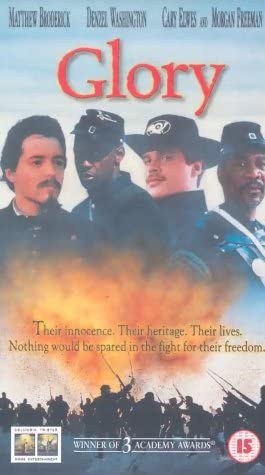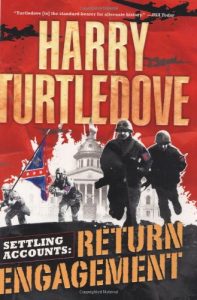 Another movie night just past, and thusly do I dash off another quick correspondence. Although there are not always themes, the theme this week was ‘movies with Denzel Washington’, and the one that got picked was Glory. (Actually, part of that is a lie; it was picked last week but not watched in favor of general jabbering. So, this week instead. Now You Know!)
Another movie night just past, and thusly do I dash off another quick correspondence. Although there are not always themes, the theme this week was ‘movies with Denzel Washington’, and the one that got picked was Glory. (Actually, part of that is a lie; it was picked last week but not watched in favor of general jabbering. So, this week instead. Now You Know!)
The thing I don’t like about period pieces are all the touches of accuracy. I’d rather not hear the soldiers sitting around their campfires or the officers in their captured mansions playing tootley music of the type I associate with Yankee Doodle Dandy. I understand that something being right is supposed to immerse me in the moment, but having to contemplate how bad peoples’ taste used to be ends up jerking me out of it.
My bitch out of the way, this was a really good movie. I mean, it was a really good movie all on its own, about what people find to be worth fighting and dying for, about the way that officers and enlisted men can, should, and do interact, and to a much lesser extent than the title would have you believe, about what honor and what accolades are to be found on the field of war. Then, on top of that, you’ve got the shades of our racist past that I find it all too easy to forget probably still exists even today, when I’m not busy contemplating it (like now). I can’t say exactly why, nor what it says about my psyche, but I always tend to enjoy more a movie that makes me mad because the characters are being so stupid about a question that I find it hard to remember wasn’t always long ago answered. Probably I just like the adrenaline rush of being angry, though.
Also, there should be more movies with Ferris, Morgan Freeman, and Westley all sharing screen space.
 I think half the fun of alternate history writing comes from the winks and nudges that the author is able to give the informed reader about the parallels and outright differences between what got written and what really happened. Not that this is hard to achieve in a Turtledove novel; he’s the genre’s Grisham, writing alternate history for the masses, which means that he’s not really writing beyond the high school history level on most occasions. There are certainly things to spot even for more informed readers, but they’re rare. (Or else, I’m insufficiently informed; that’s likely.)
I think half the fun of alternate history writing comes from the winks and nudges that the author is able to give the informed reader about the parallels and outright differences between what got written and what really happened. Not that this is hard to achieve in a Turtledove novel; he’s the genre’s Grisham, writing alternate history for the masses, which means that he’s not really writing beyond the high school history level on most occasions. There are certainly things to spot even for more informed readers, but they’re rare. (Or else, I’m insufficiently informed; that’s likely.)